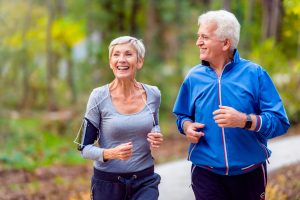A Woman’s Perspective: Good Choices Can Lead to Aging Well

It is true, people age differently, and some of us age more quickly than others. The good news is that it is possible to change your aging in a better direction at any time in your life — the key is to do your part to foster healthy cell renewal in your body. In “The Telomere Effect: A Revolutionary Approach to Living Younger, Healthier, Longer,” authors Elizabeth Blackburn, Novel Prize-winning molecular biologist, and Elissa Epel, a UCSF health psychologist, conclude something I’ve long believed: How we age is dependent on our cellular health, on the health of the vital caps at the end of each strand of DNA protecting our chromosomes called telomeres. Known as “the aging clock” of cells, telomeres get shorter as our cells replicate themselves to live and grow. Over time they get so short that they do not do their job properly, and they eventually stop functioning. What’s important is that telomeres get shorter faster when things such as stress, smoking, obesity, lack of exercise, and poor diet enter our lives. How fast we age then is significantly influenced and determined at our cellular and telomere level by many things, including the amount of exercise we get, food we eat, and stresses and emotions we feel over time.
Matter of Choice
Yes, we all have good and bad genes influencing our longevity, but they tend to average out. Today we know that the speed of our aging process is more about choices made by — and for — us in childhood as well as in adolescence and adulthood, in terms of the lifestyles we keep affecting our cellular health. With this in mind, I encourage you to take time to evaluate or re-evaluate the sources of stress, threats, and challenges in your lives that can be changed and improved. (Some studies suggest ongoing stress can make you appear up to 10 years older).
You are also encouraged to take time to develop a longer more restorative sleep and nap pattern. Seven to nine hours are recommended each night for optimum brain function, and studies now show naps improve memory over time. Practicing mindful eating — not giving in to cravings and overeating that contribute to obesity, cardiovascular disease, and diabetes — is another “aging better” lifestyle change you can make at any time.
Research to Know
Research on healthy aging indicates that:
• Positive people are less prone to mental decline. Adults who think of age as a means to overall satisfaction and wisdom are more than 40 percent more likely to recover from a disability than those who see aging as synonymous with helplessness or uselessness.
• A balanced low-glycemic diet, high in fresh fruits, vegetables, lean protein, and whole grains, and the Mediterranean diet, which is rich in plant-based foods, whole grains, nuts, fish and red wine (in moderation) contribute to fewer heart attacks and strokes over time.
• Walnuts, salmon, and flaxseed, which are rich in omega-3 fatty acids, continually help our bodies manufacture the oils skin needs to protect itself.
• Being active — even a little each day — helps maintain body strength and reduces memory loss.
• Maintaining strong social ties overtime results in stronger disease-fighting immune systems.
• Taming and managing stress levels can be as simple as taking a couple of minutes for yourself, unplugging from technology, taking a walk, meditating, or light exercise.
What to Avoid
Healthy aging is helped by avoiding specific things such as:
• A high sodium diet. Nearly two-thirds of Americans over 60 have high blood pressure. This can lead to health complications like heart attack, stroke, and a decline in cognitive functioning.
• Television. Some studies show for every hour of TV watched after age 25, people lose 22 minutes from their life expectancy. It also makes you vulnerable to a sedentary lifestyle and social isolation.
• Sunlight. After a few minutes of sun, your skin stops making vitamin D and starts making skin cancer. Studies have shown applying a proper sunscreen protects your skin over time. If you have started to notice the appearance of lines, wrinkles, and dark spots on your face and hands, laser skin resurfacing is an aesthetic service that uses carbon dioxide to vaporize the top layer of skin. It is an effective treatment against wrinkles, scars, and uneven skin color and tone.
Aging well medical procedures for men and women have seen technological advancements in recent years, including a plethora of state-of-the-art controlled light-based laser and aesthetic services—allowing individuals, regardless of point of passage, to not just live life, but to embrace it with confidence. Despite all the emphasis on family history, your genetics influence a mere 7% of your health span… so that’s good news: get out there, put in the sunblock or rain hat, and go exercise. That will do more than anything else to let you have a long and healthy life.
The Marin Independent Journal welcomed Dr. Lizellen La Follette as their health columnist from 2015-2018. Her A Woman’s Perspective column appeared every fourth week in the Journal during these 3 years.
